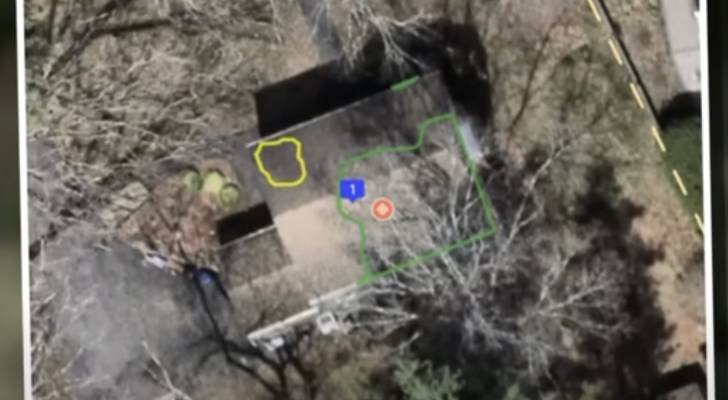Your homeowners insurance is just that — your peace of mind should something go catastrophically wrong at home.
It’s typically not something you expect to be hassled with, nor do you expect to be threatened with policy cancellation over trivial matters.
So when a Massachusetts homeowner learned her insurance company was threatening to cancel her policy based on drone surveillance that she didn’t authorize, she was understandably shocked.
“It was very invasive, because they had taken a picture of my house without me knowing, which was really kind of crazy,” Lynne Schueler old reporters at WBZ-TV in Boston.
Insurance drone surveillance is becoming common and something Americans are often unaware of — but is it legal? And, what rights do homeowners have against unauthorized surveillance by insurance companies?
A reconnaissance drone didn’t just investigate Schueler’s home — it successfully torpedoed her coverage, something she learned with astonishment in an email just weeks later.
“They were cancelling my insurance. They had shown a drone coming over the house at some point, and there were some tree branches hovering over my house that they wanted removed,” Schueler said. “I wasn’t home because my car wasn’t in the driveway.”
Her insurer gave her just six weeks to trim the branches or they’d terminate her policy.
“I was very nervous. I’m like, ‘How much is this going to cost, and can I find somebody to take these branches down?’ And, plus, I was losing branches on a beautiful tree,” she said. “It ended up costing $1,200. I had no choice.”
While Schueler was fortunate to find a tree removal company, not everyone is. The practice of insurers using drones for surveillance on policyholders is “becoming very, very common,” according to Amy Bach, executive director at United Policyholders, a consumer advocacy group.
And it’s not just risky policyholders getting spied on.
“I had insurance with this company for the last 12 years, with no claims,” Schueler told reporters. “I’ve been a good customer to them.”
“People are getting dropped based on, ‘We see mold on your roof,’ or ‘We see damaged roof tiles,’ or ‘There are trees touching your house,’ risk factors that insurance companies are increasingly on the lookout for,” Bach said.
Read more: Do you own rental properties in the US? These 6 hacks can help you boost your income and lower your tax burden
But the insurance companies aren’t doing the spying themselves. Instead, insurers are buying them from “insurtech” companies — private investigators that use innovative technology to help insurers be more efficient and save money.
“It’s kind of like your credit score is a big deal. Now, your insurance score is a big deal in terms of whether or not they are going to keep you, what they’re going to charge you,” Bach told WINK News in Fort Myers, Florida.
As the trend towards increased surveillance continues, some experts and authorities are starting to voice concerns publicly. “We are pushing for there to be some reasonable limits on insurance companies’ ability to take these photos and use them, but of course, insurance companies are pushing back,” said Bach.
Massachusetts state representative David LeBoeuf is championing homeowners’ rights and the need for legislation. He’s introduced a bill to protect homeowners’ privacy and rights:
“It gives you the right, if your homeowner’s insurance policy is not renewed because of the use of an aerial image, to actually see that image, to know when it was taken, to have the defects identified, and to create an appeals and cures process,” he said.
Mark Friedlander of the Insurance Information Institute says drone use is already an established practice, pointing to the common sight of drones in areas hit by natural disasters.
“It is a much more precise, accurate way to assess the condition of homes,” he said. “Insurers have a right to inspect your home, and we feel it’s much less intrusive [to use] a drone to take aerial imagery versus sending somebody out.”
And it’s only going to become more common. According to the Wall Street Journal, by 2030, satellite technology could allow properties to be photographed and updated daily, adding a new level of scrutiny from insurers.
As for Lynne Schueler, her policy was eventually renewed for another year, but she knows that her property will be subject to drone surveillance before her insurer offers her any new policy.
But just because insurers can use drones for aerial inspection of your home, here’s what your insurer cannot do when surveilling you:
Trespass on your property
Record the inside of your home without your permission
Harass or intimidate you
Misrepresent themselves (claiming to be a city or utility worker, for example)
Friedlander says the most common time when insurers may inspect your home via drone is when it is time to renew your policy or when you have just purchased new coverage.
“The goal isn’t to eliminate customers,” he said. “It is to assess risk and make sure that the home meets the underwriting guidelines of your insurance company.”
As insurers increasingly rely on drone surveillance, it’s crucial for homeowners to discuss with their insurance company how risks are assessed. Ask how they use technology and how it can affect your premiums.
Also, consider if there are any repairs you can make to your home to reduce its insurance risk. Additionally, regularly review your insurance policy and actively compare home insurance rates and coverage options.
Stay in the know. Join 200,000+ readers and get the best of Moneywise sent straight to your inbox every week for free. Subscribe now.
This article provides information only and should not be construed as advice. It is provided without warranty of any kind.

